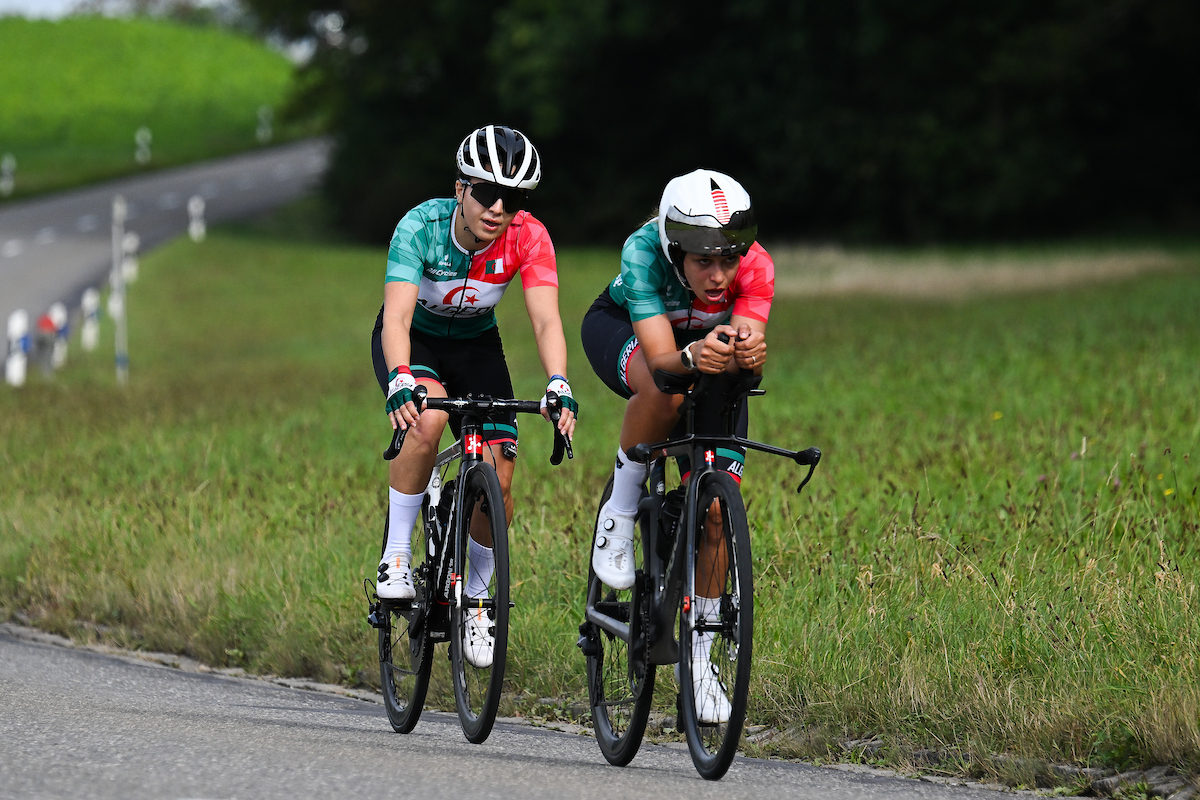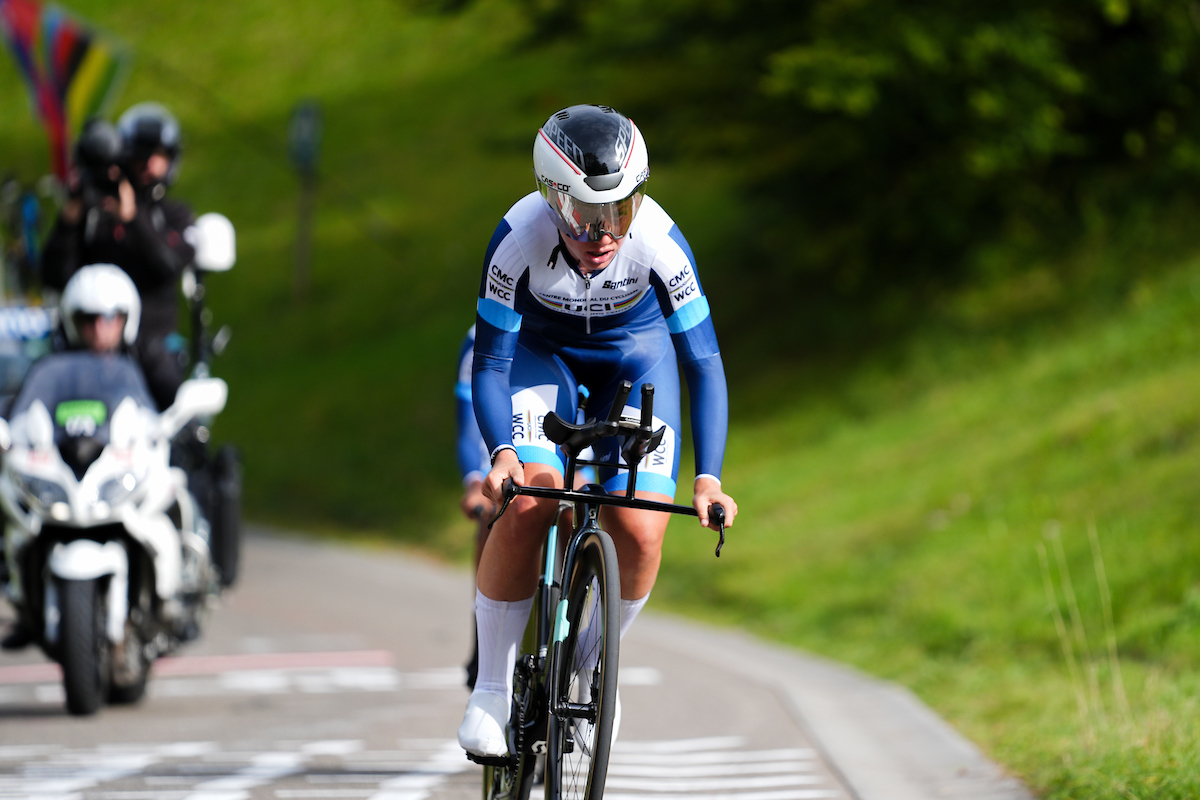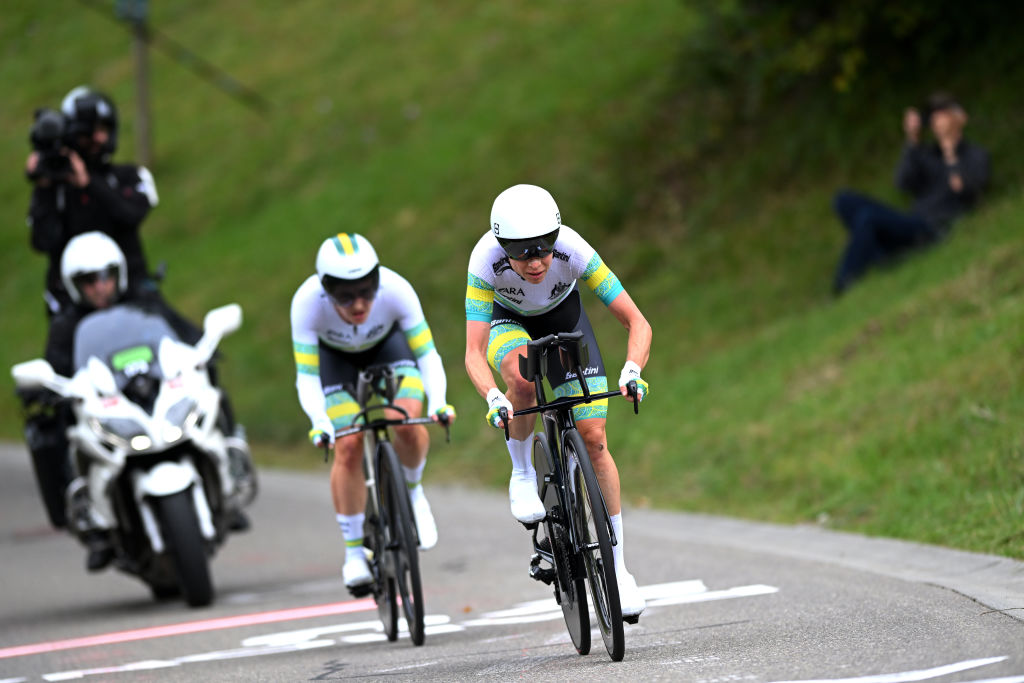
It didn’t always run like clockwork, but at least Swiss precision timing was up to the task of separating winners Australia from silver medallists Germany at the end of the Mixed Relay team time trial at the Road World Championships.
The fifth edition of the mixed relay delivered its most gripping finale yet, but a farcical scene earlier in the afternoon highlighted some of the ongoing issues with the discipline. The idea of a mixed event at the Worlds is a laudable one, but the concept continues to be sold short by the UCI’s uncertain execution.
In other sports, a relay sees a direct handover from one leg to the next. In road cycling, there is no visible changeover between the three men who ride the first half and the three women who complete the second leg. Instead, the women wait on a start ramp, unable to see the finish line, and they are only flagged away once two of their male counterparts have completed their effort.
On Wednesday, there appeared to be a breakdown in communication on that front from the commissaires, with Algeria paying the price. Like many teams, Algeria’s trio of men lost a rider in the early phase of their effort on the hilly course. When a second rider later crashed, it seemed Algeria’s relay was over, and the waiting women’s team made way to allow the World Cycling Centre’s female trio take the start ramp instead.
To the apparent surprise of the commissaires, the next men to cross the finish line were two riders from the Algerian squad, but amid the confusion, the World Cycling Centre women were flagged away to start their effort early, before their men had reached the finish. Shortly afterwards, the Algerian women scrambled their way into the start house and belatedly began their leg of the time trial.
The commissaires quickly ruled that both teams would simply be awarded the aggregate of the separate times recorded by their male and female trios, but, in the circumstances, it was hardly surprising that Algeria finished a distant last in the event, more than half an hour down on Australia and almost 14 minutes adrift of the nearest team, Afghanistan.
“They had told us we couldn’t do the start, so we were without a warm up, without anything. We had to start cold into the race, and that wasn’t easy,” Algeria’s Yasmine El Meddah explained in the mixed zone afterwards.
“The men had one rider who was dropped and another who fell, and they told us women we couldn’t start. The dropped rider got back on afterwards, so then they said we could start, because the men came back together. In any case, it’s our first participation, we’ll try to learn from it for next year.”

Pacing
Although there were a record 20 teams in Wednesday’s mixed relay, there were some notable absentees, with the Netherlands, Belgium and Great Britain among the federations to opt against participation. The nature of the course – both its length and its difficulty – was surely a factor in those decisions.
It was certainly a weighty consideration for the teams who did make the trip, with European champions Italy drafting in climber Gaia Realini, specifically, because of the demands of the race, which took place over two laps of the arduous 26.7km circuit that will be used in the road races later this week.
“I was only selected a week before and thought it was a joke when the national coach called me,” Realini said after she had helped secure bronze for Italy, just eight seconds behind Australia. “I'm not a time triallist, but the course perhaps suited me with all the climbing. It also served as a test for the road race. Now we know how hard the climbs are.”
Each trio of riders had to take on 409 metres of total climbing on their lap of the course, and the sharp climb of Zürichbergstrasse, which came after barely 2km, caused severe disruption for many teams, including for some of the fancied later starters. It was scarcely much easier to pace a team effort on the longer ascent of Witikon that followed.
Canada took part in the mixed relay for the first time, placing seventh at 2:42. While Derek Gee was enthusiastic about the general concept, he acknowledged that a course as hilly as this was hardly ideal for a team time trial.
“It’s definitely hard to really lean into the team aspect on a course like that,” Gee said. “If you do a pull and you swap off, you’re still going uphill. There’s no recovery and there’s very little time to actually get into a rhythm. That was very much a brute strength kind of course out there.
“I think it’s also difficult to use strength discrepancies within a team, because it’s uphill straight away. You immediately hit a wall, and that cooked some guys. But it’s interesting. This was a tough one for us to start on, but I like that it’s a different course every year.”
Concept

In the middle of it all, a bike race broke out, and a gripping one to boot. Australia’s Ben O’Connor, Michael Matthews and Jay Vine were the quickest of the men, but just 7 seconds up on Italy’s Filippo Ganna, Edoardo Affini and Mattia Cattaneo, while Germany remained in the hunt at 21 seconds.
The gaps tightened in the second leg. Led by Antonia Niedermaier, Germany stormed back into contention for gold. Australia, meanwhile, lost Ruby Roseman-Gannon, but they still had Brodie Chapman and elite women’s time trial champion Grace Brown to bring them home.
Germany were the first of the medal contenders to finish, and Niedermaier and Liane Lippert might have thought they had done enough to claim the title as Chapman and Brown sprinted for the line. It came down to the finest of margins, with Australia coming home a mere 0.85 seconds quicker than Germany.
Out on the road, Italy’s remaining duo of Realini and Elisa Longo Borghini hadn’t given up the ghost. Realini’s diminutive frame wasn’t offering Longo Borghini much shelter when they swapped turns, but they were only two seconds down at the last check. In the final reckoning, however, they had to settle for third, eight seconds down on Australia.
Matthews confessed that he had raced the mixed relay largely because it offered him the rare opportunity to reconnoitre the road race course at high intensity. “That was the main goal for me, to see the course at full pace and with full lactate,” Matthews said.
Even so, his excitement at a possible team world title was palpable when the Australian men had completed their effort. Ben O’Connor was just beginning an interview in the mixed zone when Matthews drew his compatriot’s attention to a nearby television screen that showed they had clocked the best time among the men.
“We beat the Italians, look!” Matthews smiled.
With Brown on hand to anchor the Australian relay, Matthews must have known then that his day might end with a rainbow jersey, and so it proved. It was the second world title of the week for Brown, who is riding the final races of her career before she hangs up her wheels after the Chrono des Nations next month.
Amid the celebrations, the 31-year-old offered a clear-eyed assessment of a concept that is not yet adding up to the sum of its parts, and she wondered why the mixed relay had taken place on a course designed for road races.
“This was a really difficult course for a team time trial because there were literally no flat sections, so it’s hard to find three riders who are equal over a course like this. I think it could be good to have more than three riders. It’s a very different team time trial to what we usually do in Grand Tours and stuff,” Brown said.
“The event can probably be tweaked to make it a bit more exciting, to make it a better event with more participation. We’re seeing that a lot of nations aren’t entering teams because of crashes in past years, and there are riders not wanting to risk their other events. Overall, I like the concept of doing something with the men and doing something as a team – but there’s room for improvement, I think.”
Get unlimited access to all of our coverage of the 2024 UCI Road World Championships - including breaking news and analysis reported by our journalists on the ground from the junior, under-23, and elite time trials and road races as it happens and more. Find out more.







